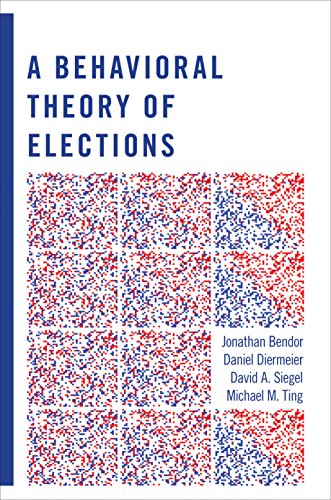Articoli correlati a A Behavioral Theory of Elections

Most theories of elections assume that voters and political actors are fully rational. While these formulations produce many insights, they also generate anomalies--most famously, about turnout. The rise of behavioral economics has posed new challenges to the premise of rationality. This groundbreaking book provides a behavioral theory of elections based on the notion that all actors--politicians as well as voters--are only boundedly rational. The theory posits learning via trial and error: actions that surpass an actor's aspiration level are more likely to be used in the future, while those that fall short are less likely to be tried later.
Based on this idea of adaptation, the authors construct formal models of party competition, turnout, and voters' choices of candidates. These models predict substantial turnout levels, voters sorting into parties, and winning parties adopting centrist platforms. In multiparty elections, voters are able to coordinate vote choices on majority-preferred candidates, while all candidates garner significant vote shares. Overall, the behavioral theory and its models produce macroimplications consistent with the data on elections, and they use plausible microassumptions about the cognitive capacities of politicians and voters. A computational model accompanies the book and can be used as a tool for further research.
Le informazioni nella sezione "Riassunto" possono far riferimento a edizioni diverse di questo titolo.
"It . . . need[s] to be confronted and digested by every graduate student who hopes to make his or her scholarly name in this field, because it provides a way to unify the higgledy-piggledy world of political behavior. It isn't the final word, but it is an important early step."--Kenneth A. Shepsle, Perspectives on Politics
Le informazioni nella sezione "Su questo libro" possono far riferimento a edizioni diverse di questo titolo.
- EditorePrinceton Univ Pr
- Data di pubblicazione2011
- ISBN 10 0691135061
- ISBN 13 9780691135069
- RilegaturaCopertina rigida
- Numero di pagine254
- Valutazione libreria
(nessuna copia disponibile)
Cerca: Inserisci un desiderataSe non trovi il libro che cerchi su AbeBooks possiamo cercarlo per te automaticamente ad ogni aggiornamento del nostro sito. Se il libro è ancora reperibile da qualche parte, lo troveremo!
Inserisci un desiderata
